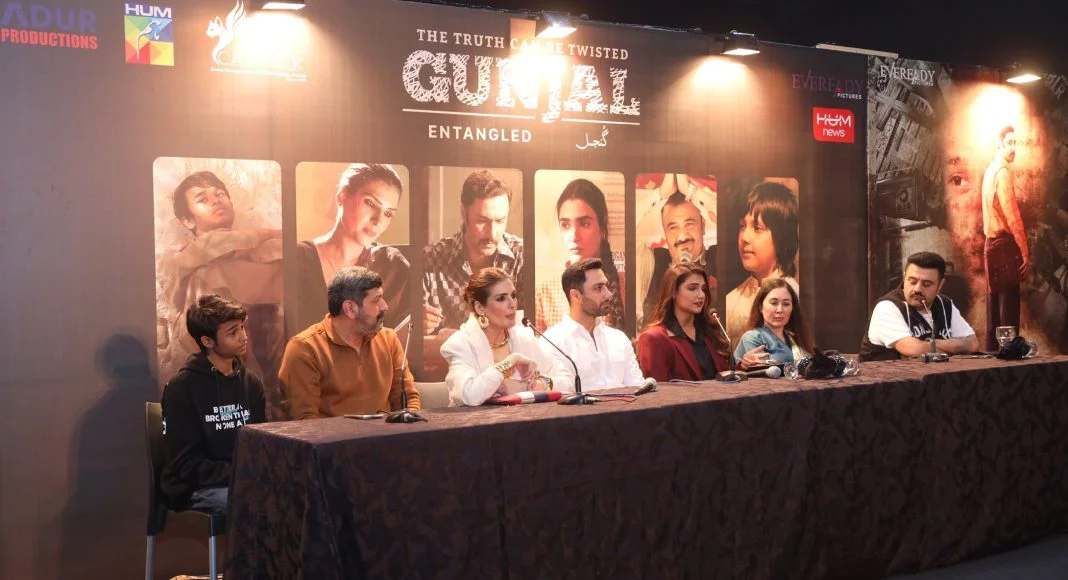
Ahmed Ali Akber in a scene from Gunjal
A slow-burning sensation commands one’s attention throughout Gunjal, a fictionalised telling of a real-life murder.
Iqbal Masih was killed in cold blood at a plantation in his village Muridke (Muridwala in the film) on a dark night on April 16, 1995. He was 12 and a Christian.
Sold off in bonded labour by his mother because of debt, Masih had been the poster-child of a local NGO in their war against child labourers in the rug-making business. The news made newspaper headlines back in the day but, by 1997, was relegated to small reports on the inner pages.
When Gunjal starts, it is 1997, and the uproar has all but died. The long-drawn court case of a boy found dead in mysterious circumstances is on the verge of judgement; the outcome, though, is of little relevance to Shahbaz Bhatti (Ahmed Ali Akbar), a journalist of little consequence.
Bhatti is a slacker. He bunks legal proceedings, preferring to copy notes from a friend as if it’s school homework, because he has more important things to do…like finding a new job. We learn that his publication, the daily newspaper Nai Subha, run by the late owners’ daughter Sarwat (Resham), is closing shop in a month, and that his mother needs to have her glaucoma operation.
Gunjal is about the murder of child activist Iqbal Masih and may not be to everyone’s taste, but its determinedly unflashy tone and excellent acting make it worth watching
Bhatti’s life is full of real-life hiccups that hardly rise above the mundane — a parallel that seeps into Gunjal’s storytelling. Writer Nirmal Bano and Ali Kazmi’s screenplay — she wrote Zindagi Tamasha, he edited and sound-mixed Aakhri Station — is built on the mundane.
It is slow, non-catastrophic and about as dramatic as an angry dinner conversation (Spoiler Alert! The film has an angry dinner conversation!). The highest point in the film, other than Masih’s murder, is a verbal fisticuff on the elitist nature of high society and an angry walkout.
The walk out is by Meher (Amna Illyas), a somewhat righteous, hot-headed member of the NGO that safeguarded, and villainously exploited, Masih — though at that point of time, we have scant information of these particularities.
Those who know of Masih (or have refreshed their facts before watching the film), will find the lack of linearity in events concerning; those who prefer to know the story through the film will be in a state of perpetual confusion.

The pieces of the jigsaw puzzle take their sweet time locking into place. The creative decision to unravel the story with leisure and ambiguity might not have been the best of calls for director Shoaib Sultan. However, after previewing the film, one assumes that he didn’t have the luxury to bend and mend the narrative into working order otherwise.
Gunjal’s story feels like a byproduct of a harshly trimmed edit. The almost dry, commonplace events of Bhatti’s own life, and his eventual pursuit of Masih’s death, are intermingled with smidgens of the boy’s backstory at regular intervals to clarify questions that the audiences may have.
Those instances provide just enough context to straighten out an odd point or two without pushing the plot into new territory. Around three-quarters into the film, we are presented with conflicting depictions of a not-so-key event that puts a minor cloud of mistrust on to the narrative spun by certain characters (I won’t give away the details here, which hark to the title’s “entangled” aspect).
Sultan’s film doesn’t have many high points, and its pace is a steady and unwavering graph of small blips that keep you just about interested in the story. The format would have looked great in a limited series on an international streaming service.
As the storytelling meanders here and there, the actors more than hold the film together throughout its two hour run-time. Ahmed Ali Akber, in particular, is a gem.
No longer the budding actor of potential this reviewer saw in Siyaah a decade ago, or the friend of the lead in Karachi Se Lahore, or the desperate nobody in Laal Kabootar who helps a woman find a murderer because he wants to flee Pakistan, Ahmed Ali Akber is now a legitimate character actor.
Slipping into nuanced mannerisms of a man who would disappear into a crowd, Bhatti is deliberately depicted as a layman whose confidence and conviction gradually grow with the narrative; note the way Akber plays the character — only a person blind to the art of acting would find a direct parallel between Bhatti and Parizaad, his popular character from television.
Akber’s Bhatti shares subtle chemistry with Amna Ilyas’ Meher — however, don’t mistake it for romance; to paraphrase the bard, there are more things in heaven and earth than romantic and platonic relationships.
Illyas, given her natural style of acting, imbues the character with an all-too-human dimension. Her character-play is effectively nonchalant and realistic; in retrospect, it is the best way to play Meher, who could have been played a number of wild and varied ways, and that would have thrown-away the unexcited ambiance of Sultan’s storytelling.
While Resham is fine as the editor’s daughter who is challenged on her hypocritical choices (she has a responsibility to her elitist community), it is Ahmed Ali Butt who really shines as the head of the rug-making industry.
Butt, as we’ve seen time and again, is a force of nature whose dramatic, semi-evil turn in Gunjal shatters his comedy-drama supporting character stereotype to smithereens (at least one hopes it does!).
Mohammed Ali, whom this writer has had the pleasure of working with on his film Future Imperfect, is the last actor in the main cast, and the reason for the film’s being. Despite his still-green skill-set as an actor, Ali brings an understated feeling of warmth, understanding and sensibility to Masih’s role, even if he looks a tad too old to play a 12-year-old.
If Gunjal were any other film, Masih’s story would have been jacked-up and melodramatised, and the flashbacks featuring him would have been padded with rousing music. Those decisions would have gone against Ali’s bright, shimmering performance, and in turn defile the very fibre of the film’s DNA.
The film’s lack of excitement, and its resilience to propagandist storytelling lends an air of authenticity that may not be up everyone’s alley (the angle of killing children or religious minorities isn’t blown out of proportion to garner international recognition by the filmmakers — thank the Almighty!).
I’ll gladly take approaches like this over unwarranted attention-seeking agendas any day of the week, and twice on Sunday…even if the storytelling is slow, unremarkable and unmistakably edited-down from a longer cut (the director has confirmed this fact to Icon upon inquiry after the preview).
Gunjal is not a cinematic masterpiece — the cinematography, colour grade, sound design, edit, resonate a calm vibe, even when things could have been — should have been — ramped-up to trigger the audience’s emotions; there are ways to pull them off, within the tonality hard-fixed by Sultan.
As I stated earlier, if the film were not cut down to fit a two-hour running time, it would have made a swell series. Even in its current avatar as a film, it’s not half-bad.
Released by Eveready Pictures and produced by Adur Films, “Gunjal” is edited by Sean Faust, Mahad Ali Sajid, Anuradha Singh, cinematographed by Ikram Khan, with music by Mannan Munjal. The film is playing in cinemas Pakistan wide and is rated “U” (Universal) and is deemed suitable for all ages by the Sindh Board of Film Censors (regional certifications may vary).
Source:


